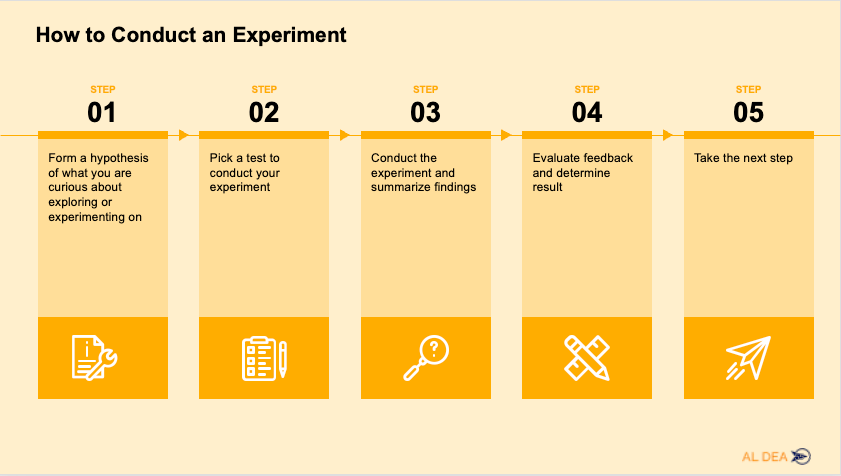To Help Your Employees Grow, Run More Career Experiments
Over the past few weeks, I’ve been spending time in virtual and in-person sessions focused on helping managers and leaders develop their people development skills needed to manage and lead effectively.
Throughout the training, common questions and themes bubble up, ranging from how to assign work, how to deliver difficult feedback, how to manage low performers and how to manage up, down and across.
Many of these are what you’d expect from people managers, especially those who are new to a role. (And if you’re wondering the answers to these questions, make sure to check out my podcast episode with Radical Candor CEO, Jason Rosoff)
But more and more, I am getting a type of question that comes up related to how do I help my employees develop in their careers? How do I make sure I can actually retain my high performers so they want to say?
I’m grateful to see this question because it means that these managers understand that part of their role is to in fact help unlock the growth and potential of each of their employees.
I’ve written previously about philosophically speaking, what I see as the role of the manager when it comes to employee career development but today I wanted to share one tactical action managers can take and that is to help employees run their own career experiments.
What is a Career Experiment?
Definition of a Career Experiment: A hypothesis driven approach to exploring curiosities and interests about your career growth. A career experiment helps you practically act your way into growing your career
Career experiments give us permission to explore and learn about something that is interesting or meaningful to us.
They also provide us space to fail, learn, and try again. Intuitively, we all know that these are things that are important, but we often fail to create conditions to do this.
Just like a science experiment, a career experiment has merit, but when it succeeds and when it’s proven false. Instead of approaching our career development as having a clear sense of the 10 steps you need to take on a clear path, you can think more about intentionally trying something out, learning, and then taking a step. And for some, the experiment scope might mean actually figuring out if a particular path is as interesting and exciting to you as it seems, but it can also be something much smaller.
Career experiments allow us to explore interests and curiosities. They give us permission to explore and learn about something that is interesting or meaningful to us.
They also provide us space to fail, learn, and try again. Intuitively, we all know that these are things that are important, but we often fail to create conditions to do this.
The beauty of a career experiment is that it does just that. Just like a science experiment, a career experiment has merit, but when it succeeds and when it’s proven false. Instead of approaching our career development as having a clear sense of the 10 steps you need to take on a clear path, you can think more about intentionally trying something out, learning, and then taking a step. And for some, the experiment scope might mean actually figuring out if a particular path is as interesting and exciting to you as it seems, but it can also be something much smaller.
You might be wondering, that sounds great, so how do I do this?
The Elements of a Career Experiment
You might be wondering, “how do I help an employee run a career experiment?” Great question. Every career experiment has four key points:
Hypothesis: A Hypothesis is an educated guess of what you believe to be true
Test: A test is a way to experiment to test and prove true/false if the hypothesis is true. We’ll come back to how to run tests, so hold your thoughts for now
Learning: A Learning is a key insight or summary from the test that fuels how you move forward
Action: An action is a result and step you take, to move forward
The Different Types of “Tests”
The crux of a career experiment is a test, or something you do to evaluate your hypothesis. A test is simply a course of action that helps you gain more insight into your hypothesis. Think of a test as a way to learn about your curiosity, and given that there are so many ways to learn, there are a lot of different options of tests. To make things simpler to start, here are a few common types of tests.
Curiosity Conversations - Informal conversations with experts and peers in your chosen curiosity
Role Expansion - Trying out through expanding your responsibilities in your current role
Side Project or Side Hustle - Testing it out through a project outside of your core day job, or outside of work
Shadowing - Finding someone who is doing something you’re curious about and following them around to observe what they do and how they work
How it Works
Here is a step by step process for how to run a career experiment
Step 1) Form a hypothesis of what you are curious about exploring or experimenting with
Step 2) Pick a test to conduct your experiment
Step 3) Conduct the actual experiment, summarize your findings
Step 4) Evaluate the feedback, and determine the result
Step 5) Take the next step, or run another experiment
Examples of Career Experiments
Curiosity Conversations to Explore Other aspects of a role - As a product marketer, I knew that PMM was a diverse and multifacated role. One area of product marketing I didn’t have experience with was demand generation. My hypothesis was that, if I wanted to advance in the profession, I needed to get a good understanding of this discipline, but I didn’t know much about it. So I went and talked to the Demand Gen team within my company to learn about the role and why it matters to product marketers.
Carving Out a new Project to Explore a Curious itch - After 2 years as a product marketer I was getting tired of working on the same work. However, there was one area of product marketing that I was curious about, and that was competitive intelligence. While I could in fact look for roles on the CI team, instead, I talked to my manager about scoping a small workstream around Competitive Intelligence. I enjoyed this work, and it helped improve my attitude about the role that I was in because it gave me something new and challenged me in a new way. The work I did ended up becoming so valuable, that eventually we created our own team around competitive intelligence in our organization, which I got to be a part of.
Take on a side hustle to find more time to do things I enjoy - I enjoyed writing but wasn’t getting to do a ton of it my in day job, so I started focusing more on it outside of my day job. Instead of giving up on MBASchooled, I continued to write while working as a management consultant, and even picked up more writing projects writing for The Muse. This eventually led to writing a book, starting a podcast, this newsletter, and many other writing opportunities For Fast Company, Insider, and many other places.
Conclusion: Progress is the Result of Action
Many employees get stuck trying to analyze their way into an action plan. While analysis and reflection are important, you can’t think your way to career growth. Help your employees get unstuck by helping them run career experiments to see what possibilities they can generate and paths they can explore.
If you’re looking for some help for your learning and development, leadership development or professional development for this year, I’d love to work with you: Here is how I might be able to assist:
Team Trainings & Professional Development: Happy to facilitate training or professional development opportunity for your team & organization - common topics include: influence without authority, navigating change, hybrid working, and others.
Consulting & Advisory Work - Are you looking to improve the ways of working of your team or organization or looking for guidance on remote/hybrid work? Let’s chat about how we can work together
Leadership & Learning Programs: Formal training and leadership development in your company, such as new manager or new leader training, or skill-based programs.
Feel free to contact me directly for more details!
Have a great week!
Al






